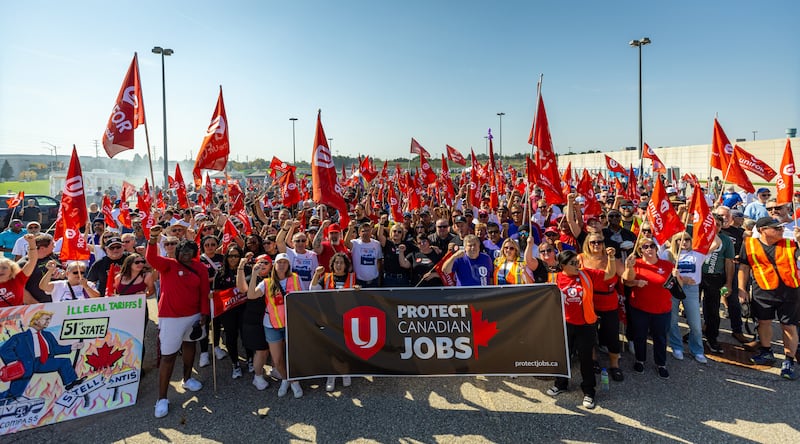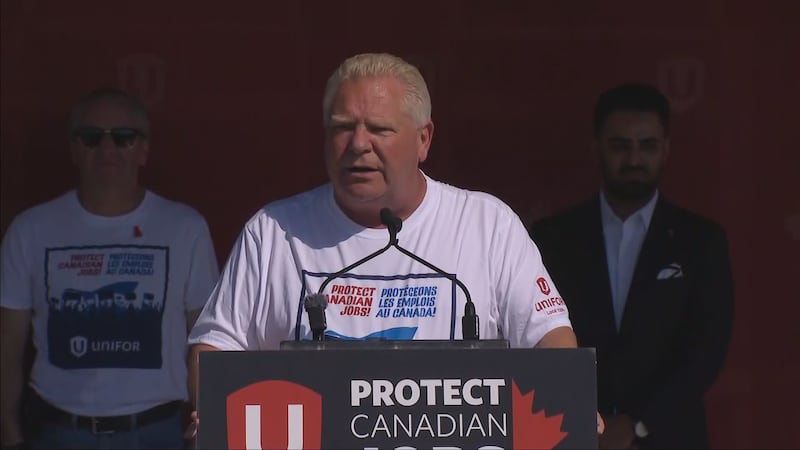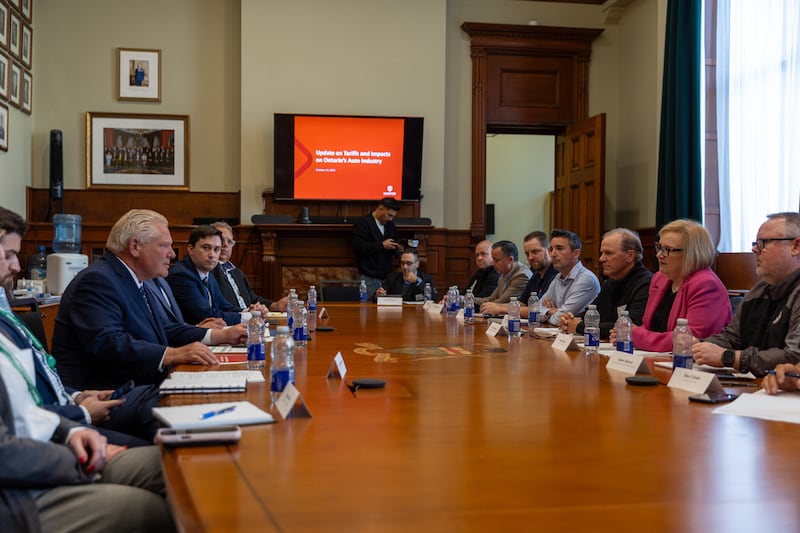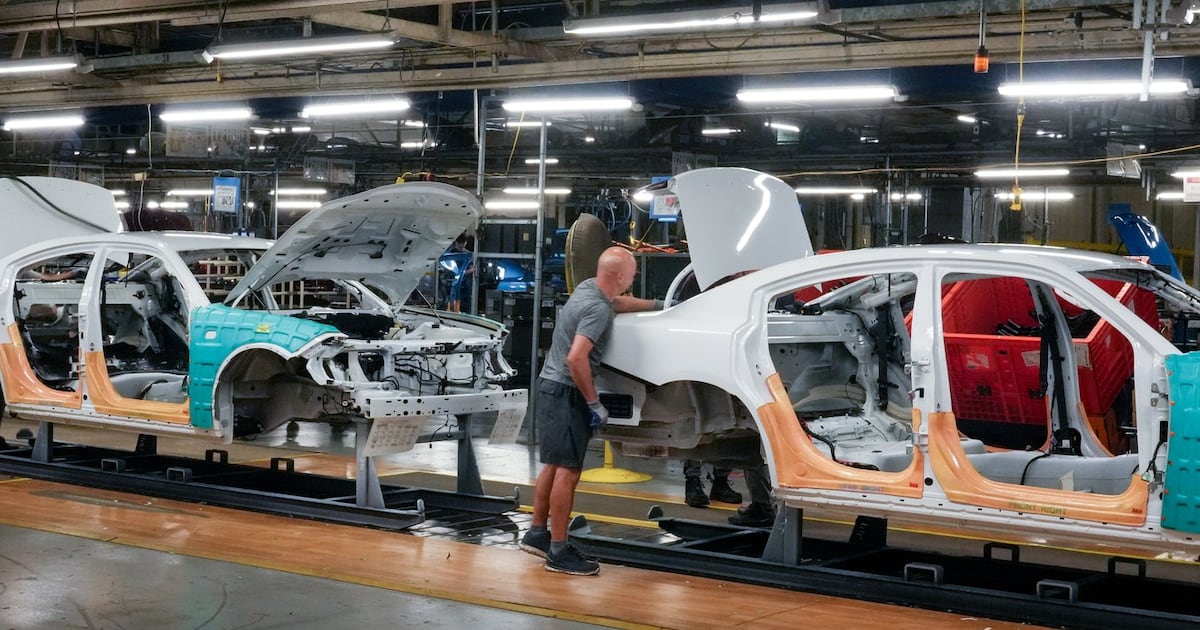Stellantis has announced plans to move production of its Jeep Compass to Illinois, after previously pausing production at the Brampton, Ont., plant in February as a result of U.S. President Donald Trump’s tariffs.
The automaker had “temporarily” paused work on the new electric SUV in the midst of Trump’s initial tariff threats at the start of the year. It was originally scheduled to go into production at the plant on Williams Parkway later this year.
But in a release on Tuesday, Stellantis confirmed it was investing more than US$600 million to reopen its Belvidere Assembly Plant in Illinois “to expand production.”
“With an initial production launch expected in 2027, these actions are anticipated to create around 3,300 new jobs (in the U.S.),” the release read.
That money was part of a larger investment of US$13 billion announced Tuesday that Stellantis’ CEO said was “the single largest in the company’s history” and meant to “increase its domestic manufacturing footprint.”
“As part of this announcement, we will move one model from Canada to the U.S,” Stellantis said in a statement to CTV News Toronto. “We have been in Canada for over 100-years, and we are investing. We are adding a third shift to the Windsor Assembly Plant to support increased demand of all versions of the Chrysler Pacifica and the new SIXPACK-powered Dodge Charger Scat Pack and R/T models.“
“Canada is very important to us,” the statement continued. “We have plans for Brampton and will share them upon further discussions with the Canadian government.”
 Unifor-Stellantis production Hundreds of people at the Unifor Protect Canadian Jobs rally in Brampton on Oct. 4, 2025. (CNW Group/Unifor) (Hand-out/Unifor)
Unifor-Stellantis production Hundreds of people at the Unifor Protect Canadian Jobs rally in Brampton on Oct. 4, 2025. (CNW Group/Unifor) (Hand-out/Unifor)
Unifor reacted to the news Tuesday night, saying its “concerns on the security of Canadian auto jobs were driven home today as Stellantis announced plans to invest US$13 billion to expand production in the United States market.”
“Stellantis made a commitment to Brampton autoworkers, to our federal and provincial governments, to our communities, and to this country,” said Vito Beato, vice-chair of the Unifor-Stellantis bargaining committee and president of Unifor Local 1285, representing workers at Brampton Assembly Plant. “We intend to hold Stellantis to everything it promised.”
Prime Minister Mark Carney also reacted to the news, writing in a statement that his government will “always be there” for Canadian auto workers.
“Together with the Government of Ontario and Unifor, we are working with the company to develop the right measures to protect Stellantis employees and to create new opportunities for them in and around Brampton,” Carney said. “We have further made clear that we expect Stellantis to fulfill the undertakings they have made to the workers of Brampton.”
“Today’s decision is a direct consequence of current U.S. tariffs and potential future U.S. trade actions.”
The Ontario government announced in 2022 that it would invest C$132 million in helping Stellantis retool and modernize the Brampton plant for electric vehicle production, with a matching investment coming from the federal government.
In a statement provided to CTV News Toronto, Ontario Premier Doug Ford said he will “never stop fighting” for autoworkers in the province.
“I have spoken with Stellantis to stress my disappointment with today’s decision to prioritize investment into the U.S. and with Unifor to be clear that I will never stop fighting for Ontario’s world-class auto workers,” Ford said in the statement.
“This decision is especially painful for those workers who have been out of jobs for months. Our government will continue to use every tool we have, including through our $20 million investment in POWER Centres to support displaced workers, including through retraining to re-enter the workforce as quickly as possible.”
 Doug Ford Ontario Premier Doug Ford speaks during a rally in front of Stellantis Assembly Plant in Brampton on Saturday, Oct. 4, 2025.
Doug Ford Ontario Premier Doug Ford speaks during a rally in front of Stellantis Assembly Plant in Brampton on Saturday, Oct. 4, 2025.
Ford added that no provincial funding has been provided to Stellantis for its Brampton project.
“Stellantis has a duty to live up to their promise to Brampton autoworkers and continue with their allocation in Brampton,” he said. “No provincial funding will be given until we receive clear assurances on when the plant will restart operations and meet that commitment.”
The premier also reiterated calls he made earlier in the day for the federal government to maintain tariffs on Chinese electric vehicles.
Earlier this month, Ford attended a rally outside the Brampton assembly plant and urged Stellantis’ CEO to reopen the location.
Unifor said a delegation of their auto leadership members also met with the premier Tuesday, before the Stellantis news broke, to discuss strategies to counter ongoing U.S. tariffs on Canadian-made vehicles and protect auto jobs.
“Our governments must, right now, demand that vehicle investment is retained in Brampton and use every lever of influence at their disposal to protect these Canadian jobs,” said Unifor National President Lana Payne.
“Stellantis cannot be allowed to renege on its commitments to Canadian workers, and governments cannot stand by while our jobs are shifted to the United States. Saving Brampton Assembly must now be this country’s top priority, sending a strong message to any corporation thinking they can take the same egregious actions.”
 Unifor-Stellantis production Unifor Auto Leadership meet with Premier Doug Ford on Oct. 14, 2025. (CNW Group/Unifor) (Hand-out/Unifor)
Unifor-Stellantis production Unifor Auto Leadership meet with Premier Doug Ford on Oct. 14, 2025. (CNW Group/Unifor) (Hand-out/Unifor)
Brampton mayor Patrick Brown also commented on Stellantis’ announcement Tuesday night, saying in a statement, “I am deeply disappointed by Stellantis’ decision to end production of the Jeep Compass at its Brampton Assembly Plant. This announcement represents a step backward from its commitment to modernize and retool the Brampton facility – a commitment that gave its 3,000 workers and their families hope for a secure and sustainable future in auto manufacturing.”
“This announcement is disheartening for the thousands of highly skilled, highly trained and loyal employees who have given so much to this industry,” the statement continued.
Brown also called for a “coordinated national strategy” to protect autoworkers.
Last week, U.S. Commerce Secretary Howard Lutnick dismissed any prospect of a comprehensive auto deal with Canada, according to three sources in the room when he made the comments.
According to the sources, Lutnick said the U.S. could continue buying parts from Canada, “but that’s about it.”

